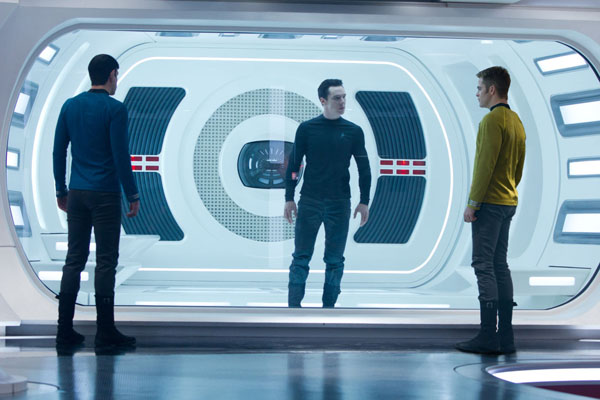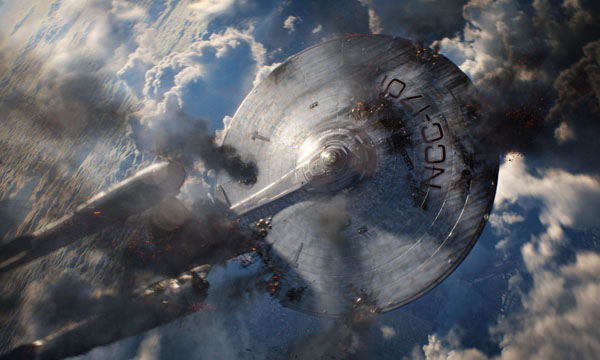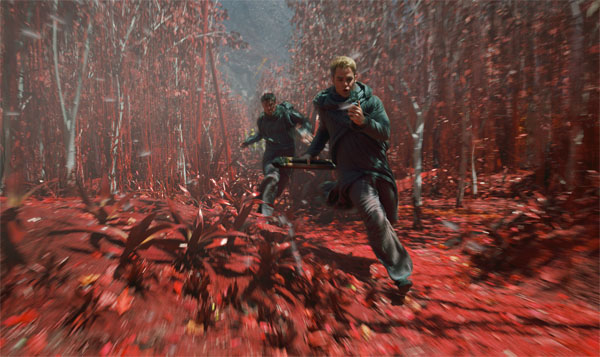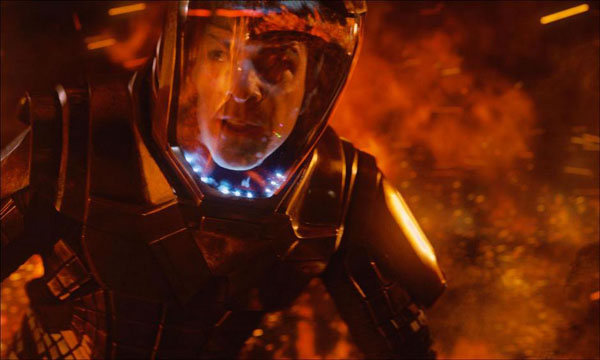“Director J.J. Abrams has followed up his sensational 2009 Star Trek reboot with a sparkling 3D sequel,” announces the Guardian‘s Andrew Pulver. “The core of the earlier film is present and correct: Chris Pine as the unfeasibly handsome junior Kirk; Zachary Quinto as the fringed logician Spock; Zoe Saldana—her status subtly enhanced after her leading role in James Cameron’s Avatar—as the lissom Lt. Uhuru; Karl Urban as grandstanding medical officer Bones; and Britain’s own Simon Pegg as engine-room supremo Scotty, gamely approximating a Scottish accent about half the time.” Pulver notes that “rumors have been swirling as to how this Star Trek film—the 12th, incredibly—locks together with a much earlier entry in the sequence. Suffice to say that it’s not actually all that interesting: one supervillain, these days, is very much like another, whatever their superficial attributes are. The real grit is provided, as ever, by the emotional politics, always Star Trek‘s strength.” All in all: “People are unlikely to charge out of the cinema with quite the same level of glee as they did in 2009; but this is certainly an astute, exhilarating concoction.”
“The iconic odd-couple friendship between Spock and Kirk is front and center from the off, as Kirk violates the Prime Directive in order to save Spock’s life and winds up inadvertently playing God to an impressionable alien race.” Emma Dibdin for Digital Spy: “But it’s not long before Starfleet has bigger fish to fry, in the form of Benedict Cumberbatch’s John Harrison, a physically invulnerable terrorist within their own ranks wreaking revenge-fuelled havoc on Earth and in space alike.”
“Cumberbatch’s Harrison may be dressed for a GQ cover,” writes Ian Freer at Empire, “but he is, in essence, a one-man army—watch him waste a garrison of helmeted marauders or take a vicious beating from Kirk with barely a flinch, or brutally batter some Federation flunkies. Yet, as you might expect from an actor who can comfortably portray Sherlock Holmes and Stephen Hawking, Harrison is as cerebral as he is muscular. His overall master plan may share some of the bonkers logic of Silva’s cockamamie Skyfall schemes, but Cumberbatch’s detached quality staves off hokeyness. It is a testament to the power of his performance that, although his early appearances are greeted with the most over-the-top Evil Musical Motifs imaginable, he manages to make Harrison ambiguous and chilling throughout.”
See! “Spock as an actual Vulcanologist diving into a volcano in the opening scene!” exclaims Russell Baillie in the New Zealand Herald. “See Bones and Kirk do an Aquaman! See Kirk fly through space without the aid of a spaceship! Yes, he did that last time but this time, it’s way cooler…. So far as this one goes, Into Darkness with its jeopardy-heaped-upon-jeopardy final act does take its toll on a story which suffers a little from endless ending syndrome. But getting there is an absolute blast.”
W.L. Swarts‘s problem with the new Star Trek is that it’s not Star Trek II: The Wrath of Khan (1982), which presented “a deeply personal conflict between a man feeling his age and second-guessing his past decisions and a superhuman who is passionately furious about his loss. Star Trek Into Darkness is not that. Instead, Star Trek Into Darkness is a young man at the beginning of his career learning his limitations and abilities (and those of his crew) when he responds to a crisis that threatens his home. It is, for the contemplative fans who like smart cinema, hardly a fair trade.”
But for Matthew Leyland at Total Film, Into Darkness is “fantastic fun: a two-hours-plus blockbuster that doesn’t bog down in exposition or sag in the middle. There are reversals and rug-pulls galore, most of them executed with whiplash skill.”
“The revived Star Trek films are shaping up to be the opposite of Christopher Nolan’s Batman tales in that they’re light on bleakness and attitude,” writes Time Out‘s Dave Calhoun. “There are enough gags (Simon Pegg is fun again as Scottie) and wit (the tension between Kirk and Spock is winning) between darker bouts of space fighting and ship-saving to keep the mood airy and unpretentious.”
“Abrams has crafted another movie with anchors in Star Trek‘s past and today’s reality which will be embraced equally by film goers who know a tribble from a trill and those who don’t,” writes Chris Gardner at Stuff. “It also sets us up for another film which I predict will hit cinemas in September 2016 to mark Star Trek‘s 50th anniversary.”
Introducing a wide-ranging interview for Playboy, David Hochman notes that “Abrams has another to-do item: reboot Star Wars. He will direct Star Wars: Episode VII, the first in a new series of Star Wars films to come from Lucasfilm, which Disney bought from George Lucas last year for $4.05 billion. At first the Twitterverse cried out that it was too much for one mortal to oversee both galaxies, but the blowback ended fast. Having helmed Trek, Mission: Impossible III and TV sensations including Lost, Fringe, Revolution, and Alias, Abrams is probably better suited than anyone to juggle both phaser and lightsaber.”
Update, 5/2: “It took three men to come up with Star Trek into Darkness’s plot,” notes the Telegraph‘s Robbie Collin: “Roberto Orci and Alex Kurtzman, who wrote the last film, and Damon Lindelof, who co-authored Prometheus and the television series Lost. Together they have come up with a very clever sleight-of-hand: all of the narrative cracks are papered over with references to old Star Trek characters and episodes. ‘Hang on a minute,’ you find yourself thinking, ‘that doesn’t make sen … oh look, a Tribble.’ The malevolent genius of this is best appreciated in a cinema filled with confirmed Star Trek fans, who will dutifully whoop and applaud a familiar alien while the film quietly pulls off another dubious plot manoeuvre under their noses.”
Updates, 5/3: This is “a sequel in every respect equal or even superior to its splendid 2009 predecessor,” finds Variety‘s Scott Foundas. “Abrams, whose last pic was the lyrical E.T./Close Encounters homage Super 8, here tips his hat to the Indiana Jones series, opening with a thrilling setpiece that finds Kirk (Chris Pine) and Bones (the sly, loose-limbed Karl Urban) on the run from a tribe of very angry natives on the planet Nibiru. The natives, decked out in head-to-toe clay body paint, shimmer like human ceramics as they chase the Starfleet officers through a crimson forest, the lush colors of returning d.p. Dan Mindel all but searing the screen. Meanwhile, Spock (Zachary Quinto) toils away nearby, attempting to insert a high-tech ice cube into the raging volcano that threatens to destroy Nibiru and its inhabitants—a dangerous mission that quickly goes awry, building to a classic Trek standoff between stubborn Vulcan logic and impulsive human emotion.”
But the Hollywood Reporter‘s Todd McCarthy argues that Into Darkness “has been engineered rather than directed, calibrated to deliver sensation on cue and stocked with just enough new character twists to keep fans rapt. At its core an intergalactic manhunt tale about a traitor to the cause, the production gives the impression of a massive machine cranked up for two hours of full output; it efficiently delivers what it’s built to do, but without style or personality.”
Screen‘s Mark Adams: “Where the film works at its very best—and this is set alongside the simple fact that it is spectacular entertainment—is with the character development. Yes, Kirk and Spock are the characters around which the film spirals, and their developing friendship is the core of the story, with both actors excellent and at ease in their roles, but at the same time all of the support characters have moments to shine and great moments of dialogue that help refine and define their parts.”
Updates, 5/6: For Oliver Lyttelton at the Playlist, “while much of what made the original so entertaining remains intact, it’s all a little more hollow the second time around.”
“Star Trek may be one of the biggest franchises in Hollywood history,” writes Brooks Barnes in the NYT, “but it has one surprising flaw: Captain Kirk doesn’t travel well. Foreign moviegoers for one reason or another have never fully embraced the swaggering Starfleet captain and his oddball crew. That is a major problem for Paramount Pictures now that international ticket sales account for up to 80 percent of a movie’s total gross.”
At Thompson on Hollywood, Maggie Lange has a seven-minute making-of video.
Meantime, as Farhad Manjoo reports for Slate, Google is dead serious about turning its #1 service, search, into the Star Trek computer.
Update, 5/8: “Here,” writes Cleaver Patterson in Film International, “is the thinking man’s blockbuster, a film that doesn’t forgo intellect in favor of spectacle.” But at Movies.com, Erik Davis adds that it’s also “exciting, thrilling, funny, emotional and everything you’d want from a summer blockbuster.”
Updates, 5/11: Kim Newman for Sight & Sound: “An advantage that science-fiction/fantasy sagas such as Star Trek, Doctor Who and the DC or Marvel superhero continuities have over more grounded franchises like the James Bond series is that weird science can be used to reboot lead characters (or the entire universe) to keep up with audiences. J.J. Abrams’s Star Trek (2009) had a time-travelling villain shift all of Gene Roddenberry’s franchise into an alternate timeline whose sole survivor was Spock Prime (Leonard Nimoy), while establishing a fresh cast as new, rethought-for-the-21st-century versions of the characters from the 1960s TV show…. The tendency of inward-looking franchises to disappear up their own black holes is not entirely avoided by Abrams’s fanboyish decision to present the whole of Star Trek Into Darkness as a revision of Nicholas Meyer’s Star Trek II: The Wrath of Khan (1982)… Too much Star Trek has become—like too much contemporary Doctor Who—about itself to the exclusion of anything else. Into Darkness sets off on a mission to revisit places we have gone before in a manner that needs to be broken with if the franchise is to live long and prosper under Abrams’s captaincy.”
The Independent‘s Anthony Quinn finds that “space-age utopianism has given way to post-9/11 insecurity; the science-fiction of ideas has been supplanted by mere bombast and digital spectacle. We’re not boldly going anywhere.”
But for Nigel Andrews and Antonia Quirke in the Financial Times, Abrams’s “talents seem already a little inhuman. Here is a borderline-nonsensical script—from the men who scripted Cowboys & Aliens—and he gives it a symphonic bravura.”
Update, 5/13: “The plotting is clunky and nonsensical, but Abrams and crew bombarded me into happiness,” writes New York‘s David Edelstein.
For Time‘s Richard Corliss, “with its emphasis on its hero’s adolescent anger, the movie turns this venerable science-fiction series—one that prided itself on addressing complex issues in a nuanced and mature fashion—into its own kids’ version: Star Trek Tiny Toons. At times, the viewer is almost prodded to mutter, ‘Grow up!'”
Updates, 5/16: Chris Cabin in Slant: “For Abrams, the Spock/Kirk dynamic serves as both central dramatic relationship and a perfect abstraction of the creative process of deciding when to indulge the mythology of the series created by Gene Rodenberry and when to trust one’s own sense of creation—the personal versus the proven, played out as intergalactic action-melodrama.”
The New York Times‘ A.O. Scott finds it “hard to emerge from Into Darkness without a feeling of disappointment, even betrayal. Maybe it is too late to lament the militarization of Star Trek, but in his pursuit of blockbuster currency, Mr. Abrams has sacrificed a lot of its idiosyncrasy and, worse, the large-spirited humanism that sustained it.”
“Why,” asks Matt Zoller Seitz at RogerEbert.com, “is the film ultimately disappointing? I suspect it’s the pop culture echo chamber effect: Abrams and his screenwriters are so obsessed with acknowledging and then futzing around with what we already know about Kirk, Spock, McCoy, Uhura, Scotty and company that the movie doesn’t breathe. Star Trek Into Darkness is peppered with nods to past films and episodes: Kirk’s impetuous decision-making and horndog sexual proclivities; Spock’s denial of his half-humanness; Dr. McCoy’s cranky witticisms; Scotty’s protestations of what he and the ship ‘canna’ do; references to tribbles and neutral zones and the Harry Mudd incident…. For all its sloppiness and blind spots and fanboy pirouettes, though, Star Trek Into Darkness is still an involving film with more heart than most summer blockbusters.”
“Despite all the rebooting; despite the overwhelming hugeness of the IMAX screen; despite the up-to-the-minute 3D and digital effects, Star Trek Into Darkness has a pretty, well, cozy feel for a blockbuster,” finds Glenn Kenny at MSN Movies. “[T]his movie takes some pretty deliberate liberties with what some longtime fans might consider canon law. Already complaints of sacrilege are bubbling up from the deepest and most truculent pits of the nerdosphere. Whatever. For this viewer, the script-flippings of Into Darkness are part of what makes it fun.”
“While Into Darkness rarely resembles the thinking-man’s science fiction saga it purports to continue, the film’s worst moments are, ironically, the ones in which it pays direct homage to its forebears,” writes A.A. Dowd at the AV Club. “But there’s a middle ground between too much reverence and not enough, and the actors hit it consistently.”
“As a fellow—though not Completist-level—Trekkie, I found much to admire in Matt Yglesias’s consideration of the entire filmed catalog of Star Trek,” writes J. Bryan Lowder for Slate. “He’s correct that the fundamental spirit of the fictional universe is one of progressive humanism (if not, in my opinion, utopian idealism). But if that stuff is Star Trek’s soul, its brain, at best, is hard-core, unapologetic sci-fi geekery. It’s the kind of thing that requires an awesome correction like this to Yglesias’ piece: ‘This article originally referred to proton torpedoes rather than photon torpedoes.’ In Star Trek (as in particle physics), the distinction between protons and photons is no pedantic quibble; the entire structure of the universe depends on it! The joy of Star Trek has, for me, always been the show’s scientific—and, more often, pseudo-scientific—patina. And this, unfortunately, is precisely the element that J.J. Abrams’ new Trek films are lacking.”
Also in Slate, Dana Stevens: “The warp core of the original Star Trek has always been the deep, conflicted love between Kirk and Spock. Not for nothing were these two among the early muses of slashfic. They can be seen as unrequited lovers, romantic rivals, wisecracking space-bros, or (to get fancy) a single divided self locked in eternal struggle: the Vulcan and the human, reason and instinct, head and heart. Abrams seems to get that the connection between these two men is crucial.”
Richard Whittaker has a good long talk with Simon Pegg for the Austin Chronicle, where Kimberley Jones writes, “The tentpoles are famous for tacking 20 minutes too long onto their summer cine-spectacles, and Abrams’ is no different. He just does it better.”
Abrams has “basically completed the Star Wars-ification of Trek, with the moral dilemmas taking a backseat to operatic tales of fathers and sons and intergalactic combat,” writes Bilge Ebiri in the Nashville Scene.
“My only reservations have to do with how things are resolved, which knocks the whole thing down a notch, but overall Star Trek Into Darkness is a very strong, mostly cohesive vehicle that travels very far and very fast into the heart of its characters,” writes Peter Martin at Dallas Film Now.
Ryan Gilbey in the New Statesman: “That Benedict Cumberbatch. He’s really something, isn’t he?” And Mary Kaye Schilling meets him for Vulture.
Update, 5/19: “The movie is set in 2259, but their present is our present,” writes Ray Pride at Newcity: “it remains Dick Cheney’s world, after all, and Star Trek: Into Darkness just lives in it. The 9/11-style attack on London at the film’s beginning is followed by backstory upon cover story and bright rhetoric soars and false flags are planted alongside other false flags. They darkly wave. Political opportunity is not wasted on ready opportunists. The parallels hold and one of the film’s first closing cards, ‘THIS FILM IS DEDICATED TO OUR POST-9/11 VETERANS WITH GRATITUDE FOR THEIR INSPIRED SERVICE ABROAD AND CONTINUED LEADERSHIP AT HOME’ no longer offends, but is in fact a sincere, bold brandishing of the hidden-in-plain-sight parable about our post-9/11 times. It’s not topical overlay: this is the damning heartbeat of the screenplay by Orci, Kurtzman and Lindelof.”
For news and tips throughout the day every day, follow @KeyframeDaily on Twitter and/or the RSS feed. Get Keyframe Daily in your inbox by signing in at fandor.com/daily.







